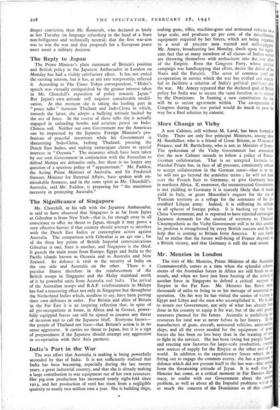India's Part in the War
The war effort that Australia is making is being powerfully seconded by that of India. It is not sufficiently realised that India has been becoming, especially during the last twenty years, a great industrial country, and that she is already making a large contribution to war equipment out of her own resources. Her pig-iron production has increased nearly eight-fold since 1913, and her production of steel has risen from a negligible quantity to nearly two million tons a year. She is building ships, making guns, rifles, machine-guns and armoured vehicles on a large scale, and produces 90 per cent. of the miscellaneous equipment required by her forces, which are being expanded to a total of 500,000 men trained and well-equipped. Mr. Amery, broadcasting last Monday, dwelt upon the signifi. cant fact that so many members of all classes of Indian society are throwing themselves with enthusiasm into the war effon of the Empire. Even the Congress Party, whose political campaign was handicapping that effort, desire the defeat of the Nazis and the Fascists. The sense of common peril and co-operation in service which the war has evoked can scarcely fail to facilitate a solution of India's political problems after the war. Mr. Amery repeated that the declared goal of British policy for India was to secure the same freedom as is enjoyed by the Dominions. In framing a new constitution the task will be to secure agreement within. The co-operation of Congress during the war period would do much to pave the way for a final solution by consent.


























 Previous page
Previous page